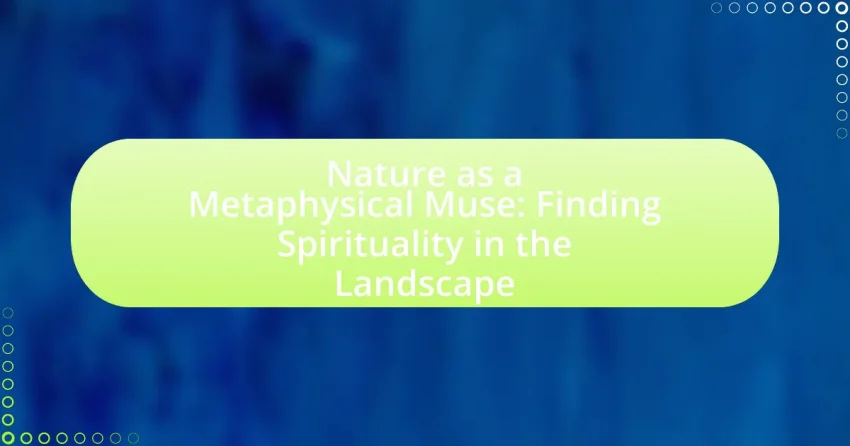The article “Nature as a Metaphysical Muse: Finding Spirituality in the Landscape” explores the profound connection between spirituality and the natural world. It examines how experiences in nature can lead to feelings of peace, awe, and belonging, supported by research indicating that time spent outdoors enhances well-being and fosters spiritual insights. The article discusses the philosophical foundations of nature as a muse, cultural perceptions of nature’s spiritual significance, and the importance of landscapes for spiritual exploration. Additionally, it addresses challenges in finding spirituality in nature, misconceptions surrounding this connection, and practical steps individuals can take to deepen their relationship with the natural environment.

What does it mean to find spirituality in nature?
Finding spirituality in nature means experiencing a deep connection with the natural world that transcends the physical realm, often leading to feelings of peace, awe, and a sense of belonging. This connection can manifest through moments of reflection, appreciation of beauty, or a recognition of the interconnectedness of all living things. Research indicates that spending time in nature can enhance well-being and foster spiritual experiences, as evidenced by studies showing that natural environments can reduce stress and promote mindfulness. For instance, a study published in the journal “Environmental Science & Technology” found that individuals who engage with nature report higher levels of happiness and life satisfaction, reinforcing the idea that nature serves as a powerful catalyst for spiritual exploration.
How can nature serve as a metaphysical muse?
Nature serves as a metaphysical muse by providing profound inspiration and a sense of connection to the universe. The intricate patterns, colors, and rhythms found in natural landscapes evoke deep emotional responses and stimulate philosophical contemplation. For instance, the vastness of the ocean or the majesty of mountains can prompt reflections on existence, purpose, and the interconnectedness of life. Historical figures such as Ralph Waldo Emerson and Henry David Thoreau emphasized nature’s role in fostering spiritual insight and personal growth, illustrating how natural environments can catalyze metaphysical exploration and creativity.
What are the philosophical foundations of nature as a muse?
The philosophical foundations of nature as a muse are rooted in the concepts of Romanticism, Transcendentalism, and the intrinsic connection between humanity and the natural world. Romanticism emphasizes the emotional and spiritual experiences derived from nature, viewing it as a source of inspiration and creativity. Transcendentalism, particularly through thinkers like Ralph Waldo Emerson and Henry David Thoreau, posits that nature is a reflection of the divine and a pathway to understanding deeper truths about existence. This perspective suggests that engaging with nature fosters a sense of spirituality and interconnectedness, allowing individuals to tap into profound insights and artistic expression. Historical examples include the works of poets like William Wordsworth, who celebrated nature’s beauty and its ability to evoke deep emotional responses, reinforcing the idea that nature serves as a powerful muse for artistic and philosophical exploration.
How do different cultures perceive nature’s spiritual significance?
Different cultures perceive nature’s spiritual significance in diverse ways, often viewing it as a manifestation of the divine or as a source of wisdom and healing. For instance, Indigenous cultures frequently regard natural elements like rivers, mountains, and forests as sacred, believing they embody ancestral spirits and teachings. In contrast, Eastern philosophies, such as Taoism, emphasize harmony with nature, seeing it as a reflection of the universe’s balance and flow. Additionally, many Western traditions, particularly in Christianity, interpret nature as God’s creation, imbued with spiritual lessons and moral guidance. These varying perceptions highlight the integral role that nature plays in shaping spiritual beliefs and practices across cultures.
Why is the landscape important for spiritual exploration?
The landscape is important for spiritual exploration because it serves as a physical manifestation of the metaphysical, providing a space for reflection and connection to the divine. Natural environments, such as mountains, forests, and rivers, often evoke feelings of awe and transcendence, which can facilitate deeper introspection and spiritual awakening. Research indicates that exposure to nature can enhance well-being and promote mindfulness, as evidenced by studies showing that spending time in natural settings reduces stress and increases feelings of connectedness (Kaplan & Kaplan, 1989). Thus, the landscape not only inspires spiritual inquiry but also supports the psychological processes that enable individuals to engage in meaningful spiritual exploration.
What elements of the landscape contribute to spiritual experiences?
Natural elements such as mountains, forests, bodies of water, and open skies significantly contribute to spiritual experiences. These features often evoke feelings of awe and transcendence, which are essential for spiritual reflection. For instance, studies have shown that exposure to natural landscapes can enhance feelings of connectedness and well-being, as evidenced by research published in the journal “Environmental Science & Technology,” which found that individuals who spend time in nature report higher levels of happiness and lower levels of stress. Additionally, the vastness of landscapes, such as expansive deserts or ocean views, can inspire a sense of humility and perspective, further deepening spiritual experiences.
How does the changing landscape influence our spiritual connection?
The changing landscape influences our spiritual connection by altering the environments that shape our experiences and perceptions of the divine. As natural settings evolve due to factors like climate change, urbanization, and ecological shifts, individuals may find new meanings and reflections in these transformed spaces. For instance, studies have shown that exposure to diverse landscapes can enhance feelings of awe and connectedness, which are integral to spiritual experiences. Research published in the journal “Environmental Psychology” indicates that natural environments significantly impact emotional well-being and spiritual engagement, suggesting that as landscapes change, so too do the opportunities for spiritual reflection and connection.

How can we engage with nature to enhance our spirituality?
Engaging with nature can enhance spirituality by immersing oneself in natural environments, which fosters a sense of connection to the universe. Activities such as hiking, meditating in a park, or simply observing wildlife can evoke feelings of awe and tranquility, promoting introspection and mindfulness. Research indicates that spending time in nature reduces stress and increases feelings of well-being, which can lead to deeper spiritual experiences. For instance, a study published in the journal “Environmental Science & Technology” found that individuals who spent time in natural settings reported higher levels of happiness and lower levels of anxiety. This connection to nature can facilitate a greater understanding of oneself and one’s place in the world, ultimately enriching spiritual life.
What practices can deepen our connection to the natural world?
Engaging in mindfulness practices, such as meditation in natural settings, can deepen our connection to the natural world. Mindfulness allows individuals to become fully present and aware of their surroundings, fostering a sense of unity with nature. Research indicates that spending time in nature enhances mental well-being and promotes a greater appreciation for the environment, as shown in studies published in the Journal of Environmental Psychology, which highlight the psychological benefits of nature exposure. Additionally, activities like hiking, gardening, and nature journaling encourage active participation and observation, further strengthening the bond with the natural landscape.
How does mindfulness in nature affect our spiritual awareness?
Mindfulness in nature enhances spiritual awareness by fostering a deeper connection to the environment and oneself. Engaging in mindfulness practices, such as meditation or focused observation in natural settings, allows individuals to experience a heightened sense of presence and clarity. Research indicates that spending time in nature can lead to increased feelings of awe and interconnectedness, which are essential components of spiritual experiences. A study published in the journal “Psychological Science” by authors like Keltner and Haidt found that exposure to natural beauty can significantly elevate feelings of spirituality and well-being. This evidence supports the notion that mindfulness in nature not only promotes mental health but also enriches spiritual awareness through the cultivation of a profound appreciation for the natural world.
What role does meditation play in experiencing nature spiritually?
Meditation enhances the spiritual experience of nature by fostering mindfulness and deepening awareness of the natural environment. Through meditation, individuals can cultivate a heightened sense of presence, allowing them to connect more profoundly with the sights, sounds, and sensations of nature. Research indicates that mindfulness practices, including meditation, can lead to increased feelings of connectedness to nature, as demonstrated in studies such as “Mindfulness and Nature: A Review of the Literature” by Capaldi et al., which found that mindfulness enhances emotional responses to natural settings. This connection can evoke a sense of awe and reverence, facilitating spiritual experiences that transcend ordinary perception.
Why is it essential to cultivate a relationship with nature?
Cultivating a relationship with nature is essential for enhancing mental well-being and fostering a sense of connection to the environment. Research indicates that spending time in natural settings can reduce stress, anxiety, and depression, as evidenced by a study published in the journal Environmental Science & Technology, which found that individuals who engage with nature experience lower levels of cortisol, a stress hormone. Additionally, this relationship promotes ecological awareness and responsibility, encouraging individuals to protect and preserve natural habitats, which is vital for biodiversity and ecosystem health.
How does a relationship with nature impact mental and emotional well-being?
A relationship with nature significantly enhances mental and emotional well-being by reducing stress, anxiety, and depression. Studies indicate that spending time in natural environments can lower cortisol levels, which are associated with stress, and improve mood. For instance, research published in the journal “Environmental Science & Technology” by Bratman et al. (2015) found that individuals who walked in nature reported lower levels of rumination and improved emotional states compared to those who walked in urban settings. Additionally, exposure to nature has been linked to increased feelings of vitality and overall life satisfaction, as evidenced by a meta-analysis in “Health & Place” by Bowler et al. (2010), which concluded that green spaces contribute positively to mental health outcomes.
What are the long-term benefits of nurturing this relationship?
Nurturing the relationship with nature provides long-term benefits such as enhanced mental well-being, increased creativity, and a deeper sense of connection to the environment. Research indicates that regular interaction with natural landscapes can reduce stress levels, improve mood, and foster a sense of peace, as evidenced by studies showing that spending time in nature lowers cortisol levels and enhances overall psychological health. Additionally, engaging with nature stimulates creativity; a study published in the Journal of Environmental Psychology found that individuals who spent time in natural settings performed better on creative problem-solving tasks. This relationship also cultivates environmental stewardship, leading to sustainable practices that benefit both individuals and ecosystems over time.

What are the challenges in finding spirituality in nature?
Finding spirituality in nature is often challenged by distractions from modern life, environmental degradation, and personal beliefs. Distractions such as noise pollution, technology, and urbanization can hinder an individual’s ability to connect with the natural world. Environmental degradation, including deforestation and climate change, can diminish the beauty and sanctity of natural spaces, making it difficult to experience a sense of spirituality. Additionally, personal beliefs and cultural backgrounds may influence how individuals perceive and engage with nature, leading to varying levels of spiritual connection. These factors collectively complicate the pursuit of spirituality in natural settings.
How can modern life hinder our connection to the landscape?
Modern life hinders our connection to the landscape primarily through urbanization and technology. Urban environments often replace natural spaces with concrete structures, reducing opportunities for direct interaction with nature. Additionally, the pervasive use of technology, such as smartphones and social media, diverts attention away from the physical world, leading to a disconnection from the sensory experiences that landscapes offer. Studies indicate that individuals who spend more time in urban settings report lower levels of well-being and connection to nature, highlighting the psychological impact of this disconnection.
What distractions in urban environments affect our spiritual experiences?
Distractions in urban environments that affect spiritual experiences include noise pollution, visual clutter, and the fast-paced lifestyle. Noise pollution, such as traffic and construction sounds, disrupts meditation and reflection, making it difficult to connect with one’s inner self. Visual clutter, including advertisements and high-rise buildings, can overwhelm the senses and detract from moments of contemplation. Additionally, the fast-paced lifestyle in cities often leads to stress and distraction, hindering the ability to engage in spiritual practices. Studies have shown that exposure to nature can enhance spiritual well-being, indicating that urban distractions significantly impede spiritual experiences.
How can we overcome these challenges to reconnect with nature?
To overcome challenges in reconnecting with nature, individuals can engage in regular outdoor activities, such as hiking, gardening, or nature walks, which foster direct interaction with natural environments. Research indicates that spending time in nature can reduce stress and improve mental well-being, as shown in a study published in the journal Environmental Science & Technology, where participants reported lower levels of anxiety after spending time outdoors. Additionally, incorporating mindfulness practices, such as meditation in natural settings, enhances the spiritual experience and deepens the connection to the landscape.
What misconceptions exist about spirituality in nature?
Misconceptions about spirituality in nature often include the belief that it is solely an individual experience, disconnected from community or culture. In reality, many spiritual practices rooted in nature are deeply influenced by cultural traditions and communal rituals, as seen in indigenous practices that emphasize the interconnectedness of all living beings. Another misconception is that spirituality in nature is exclusively about aesthetic appreciation; however, it often involves a profound sense of purpose and connection to the environment, as evidenced by studies showing that nature-based spirituality can enhance mental well-being and foster environmental stewardship. Additionally, some people mistakenly view spirituality in nature as a rejection of organized religion, when in fact many individuals integrate both spiritual experiences in nature and traditional religious beliefs, highlighting a more complex relationship between the two.
How do stereotypes about spirituality limit our understanding of nature’s role?
Stereotypes about spirituality limit our understanding of nature’s role by promoting narrow interpretations that often overlook the interconnectedness of ecological systems. These stereotypes can lead to a perception of nature as merely a backdrop for spiritual experiences rather than a dynamic entity with intrinsic value and agency. For instance, viewing nature solely through a lens of romanticism or as a source of personal enlightenment can obscure scientific insights into biodiversity and ecosystem functions, which are crucial for understanding environmental sustainability. Research by the American Psychological Association indicates that such limited views can hinder effective conservation efforts, as they may not recognize the importance of preserving natural habitats for their ecological significance rather than solely for spiritual or aesthetic appreciation.
What are the dangers of romanticizing nature in spiritual practices?
Romanticizing nature in spiritual practices can lead to a distorted understanding of both nature and spirituality. This idealization often overlooks the harsh realities of natural environments, such as ecological degradation and climate change, which can result in a disconnection from the actual challenges facing the planet. For instance, the glorification of untouched wilderness can perpetuate harmful myths about indigenous cultures and their relationship with the land, leading to cultural appropriation and exploitation. Additionally, this romantic view may encourage escapism, where individuals neglect their responsibilities to engage with environmental issues, ultimately hindering meaningful action towards sustainability.
What practical steps can we take to find spirituality in nature?
To find spirituality in nature, individuals can engage in mindful observation, which involves immersing themselves in natural surroundings and paying close attention to sensory experiences. This practice enhances awareness of the beauty and interconnectedness of life, fostering a sense of peace and reflection. Research indicates that spending time in nature can reduce stress and improve mental well-being, as shown in a study published in the journal Environmental Science & Technology, where participants reported lower levels of anxiety after nature exposure. Additionally, practices such as meditation or yoga in natural settings can deepen spiritual connections, as these activities promote mindfulness and presence. Engaging in nature walks, journaling about experiences, or participating in community nature events can also facilitate a spiritual connection, reinforcing the idea that nature serves as a powerful source of inspiration and introspection.
How can we create a personal ritual that incorporates nature?
To create a personal ritual that incorporates nature, individuals can establish a routine that includes specific activities in natural settings, such as walking in a park, meditating by a river, or gardening. Engaging with the environment through these activities fosters a deeper connection to nature and enhances spiritual well-being. Research indicates that spending time in nature can reduce stress and improve mental health, as shown in a study published in the journal Environmental Science & Technology, which found that even short walks in natural settings can significantly lower cortisol levels. By intentionally integrating these practices into daily life, individuals can cultivate a meaningful ritual that honors the natural world.
What resources are available for those seeking spiritual guidance in nature?
Resources available for those seeking spiritual guidance in nature include nature retreats, guided meditation programs, and spiritual workshops focused on outdoor experiences. Nature retreats often provide immersive environments where individuals can connect with the natural world while engaging in practices such as yoga, meditation, and mindfulness. Guided meditation programs, often held in serene outdoor settings, facilitate deeper connections to nature and personal spirituality. Additionally, spiritual workshops may offer teachings on how to interpret natural elements as metaphors for personal growth and enlightenment. These resources are supported by studies indicating that nature exposure can enhance well-being and spiritual experiences, such as research published in the Journal of Environmental Psychology, which highlights the positive effects of nature on mental health and spiritual well-being.
